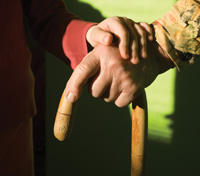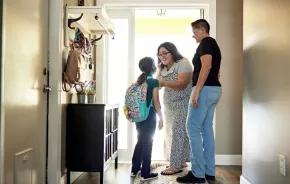 'Tis the season of giving back and, with a tight economy and so many in the Puget Sound region unemployed or underemployed, there is no shortage of needs and opportunities to make a meaningful difference in the lives of those around us. For many families, the desire to give back in a tangible, hands-on way has been there for years, but the logistics of determining when, where and how they would give back proves to be a barrier. As parents seek to fulfill the wish lists of their children, they wonder if and how their children will ever learn that it truly is better to give than to receive.
'Tis the season of giving back and, with a tight economy and so many in the Puget Sound region unemployed or underemployed, there is no shortage of needs and opportunities to make a meaningful difference in the lives of those around us. For many families, the desire to give back in a tangible, hands-on way has been there for years, but the logistics of determining when, where and how they would give back proves to be a barrier. As parents seek to fulfill the wish lists of their children, they wonder if and how their children will ever learn that it truly is better to give than to receive.
Like so many parents, Bellevue mother Rachael Podolsky wondered how she and her family could volunteer together. She found it very time consuming to research organizations, inquire about opportunities and find events that didn’t conflict with their busy family schedule — so she decided to do something about that. As part of a certificate program at the University of Washington, Podolsky led a team that created a website for finding volunteer opportunities for kids and families. That website, kidServe Seattle, launched in the spring of 2010. It allows parents to search for specific volunteer opportunities for their children by date, and find opportunities that match their availability, children’s ages, abilities and passions.
Why should kids volunteer?
Many adults know that giving simply feels good; kids can experience those same good feelings through volunteering. Podolsky has hosted focus groups for kids who have volunteered, and the recurring theme in the feedback she receives is “I feel good when I help somebody out.”
Liahann Bannerman, director of the volunteer center for United Way of King County, says that when children volunteer, they develop a sense of compassion for others and begin to feel part of a bigger community. And, Bannerman says, there are many other benefits for kids, including:
Learning
• About their community’s needs and specific topics (e.g. environment, hunger)
• Skills via the work, such as counting or reading cans of food, determining the number of scoops to make a pound, gardening and painting)
• Critical thinking skills by engaging in the selection of the volunteer opportunity, and discussing what happens next (e.g., How does the food get to people? Why does a pretty garden help people?)
• Reflection, which brings lifelong benefits by building compassion, leadership and critical thinking.
Empowerment
• When involved in the decision about where to volunteer (issue area, location, interest), helping them to feel appreciated and providing opportunity for parent-child dialogue.
• In knowing that a kid can make a difference, their work is valued by others, and they have something to contribute.
Socialization
• Through engaging with other kids and adults outside their normal circle.
Quality time
• Gives kids a great way to spend meaningful time with parents (and meets parents’ need to give back without feeling guilty for being away from their family).
• Encourages more meaningful conversation at the time of volunteering and afterward.
• Creates an important early memory of their childhood and their parents and family.
• Teaches them about their parents’ interests and viewpoints.
Compassion for others
• By gaining empathy for those less fortunate.
• Through sharing and the realization they have something to share.
• In thinking beyond their own needs and learning generosity.
Citizenship
• Children who volunteer when they’re young will continue to volunteer as adults.
• Young volunteers learn about their community and how they can have an impact on it: They can make a difference!
Bannerman says that when children volunteer, the benefits are obvious. “Children have enormous amounts of energy, tremendous enthusiasm and a willingness to learn that can be inspiring.” And the data backs her up. According to the Corporation for National and Community Service, those who volunteer have lower mortality rates, greater functional ability and lower rates of depression later in life than those who do not volunteer.
Time spent volunteering can also strengthen families. By volunteering together, parents can demonstrate to their kids how doing good for others is an important activity that the family values.
Karen Dawson, owner of Dawson Communications Group and a board member of the Dr. John K. McCormick Foundation, enjoys volunteering with her kids at Treehouse.
Resources
kidServe Seattle allows you to easily search for onetime or ongoing volunteer opportunities for kids ages 12 and younger.
Children for Children offers ideas and info for getting kids involved.
Family Cares promotes compassion and inspires families to volunteer in their communities and beyond by equipping them with resources and hands-on projects that help others in need.
GenerationOn offers resources for parents and children, including project ideas and tools.
Kids Care Clubs give parents, teachers and youth leaders the resources they need to involve kids in volunteering.
Learning to Give provides lessons and resources that teach giving and volunteerism, civic engagement and character through service activities.
The Volunteer Family encourages, facilitates, coordinates and supports volunteering activities for families.
VolunteerMatch offers volunteer opportunities specifically for kids in your geographic area.
United Way of King Countyallows you to search specifically for opportunities for families with children.










